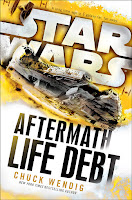Two months since I first started all this.
The goal was simple—we’ve all heard anecdotal stories about reviews being deleted for a number of reasons, but they tend to be kind of random and rarely have a lot of other information about them. Also, Amazon’s policies change a lot and seem to go through… well, random enforcement. I wanted to create a big set of data that people could refer back to when they talk about such things.
I did this by taking thirty books I’d read over the past year (thirty really good books, to be clear) and
doing a review a day for the entire month of August. Okay, almost the entire month. I recorded the title, the author, the day the review posted, and every social media or publicity connection I could think of to said author (supposedly, this is one of the big things Amazon keeps an eye on).
It’s been a little over thirty days since the last of those review posted.
What’s happened in the weeks since then?
Okay, lots of stuff. But as far as this goes…?
Well, I went back and checked all the reviews. They’re all still up as I write this. Six of them even got marked with the little “X out of Y people found this review helpful.” One of those is a control book, too.
I’ve heard nothing from Amazon. Nada. Zip. No warnings or alerts or even a mild slap on the wrist. Nothing on my account or in my email.
And keep in mind—some of these reviews
should be deleted. They blatantly violate the review rules. There’s a bunch of control reviews where I have a big conflict of interest by offering my “unbiased” thoughts.
Heck, I even admit in them that they’re biased.
Plus—I haven’t exactly been secretive that I’m doing this. I’ve mentioned it on
Facebook and on
Twitter, and it was shared/retweeted a fair amount. More than a few of the authors mentioned their reviews publicly, and I’ve usually mentioned this little experiment in the responses. I’m not going to say this was trending anywhere, but things haven’t been dead-quiet, either.
So if there’s a social media bot/algorithm searching social media for connections… it’s doing a pretty poor job.
Anyway, what can we learn from all this?
A few ideas…
Firstis that there might be more to the reviews that have been deleted than we’re being told. Maybe I logged in to my Amazon account through my author-friend’s computer and some bot registered that? Or possibly that we share the same IP, depending on just how close I am to said author-friend. Perhaps I’m very, very bad at sockpuppeting? Maybe I wrote in all caps and set off a different bot? There’s so many things that could be a possible trigger, it’s hard to be sure exactly why something was deleted.
This feeds into my second idea which is that my reviews might only get pulled when someone reports them to Amazon. Perhaps having the same last name as the author, related or not, made someone shout “J’accuse!” Maybe somebody’s a bit timid and was offended by some of the colorful terms I used to show how much I liked this book. Possibly it’s a new form of clever attack by paranoid folks—I can’t write a nasty review of your book to bring down its rating, but I could tell Amazon those two very positive reviews were actually written by your best friend/significant other/somebody you paid. Heck, if I’m trading reviews with you, it’s even possible the deletion is an attack against me, not you. How often have we seen some crazed nut chase somebody around social media responding to any and everything they post…?
Third, over the past year or three I’ve sometimes wondered if this is actually a clever trick by Amazon to encourage self-policing. I mean, if we all know our potentially nepotistic reviews are going to be taken down, we probably won’t waste time putting a lot of them up, right? Right there, that could cut 50% or more of potentially troublesome reviews—and all it cost them was a press release about their latest policy.
I know I did this for ages. There’s about a two or three year stretch where I didn’t write any reviews because everyone had me convinced Amazon would pull them immediately. And I had stuff to do so… why use up that time? Instead
I’d often get in touch with the author somehow, let them know how much I liked their book, and offer a blurb if either of us thought my name could offer any weight for them.
But I didn’t write any reviews.
Fourthis something
Chuck Wendig suggested to me. After the reviews went up, he got in touch on Twitter and bounced an interesting idea off me, based (I believe) off a few observations and some of the more…
aggressively negative reviews a few of his books have attracted. His thought was that the automatic deletion is more likely to happen to people who’ve had reviews deleted before. If one of my earlier reviews was reported for breaking one of the rules, Amazon would be more likely to apply their uber-algorithm to my later reviews.
This actually makes sense. More than a few folks have pointed out the raw amount of data the algorithm would have to process for every review of every book on Amazon (easily, say five million), and then cross-referencing them with every social media contact said author has (we could probably say, what, five thousand as an average, since Amazon is counting both ways). By my rough math, that’s like a batrillion calculations. It’s not a complicated thing to do if you’re just searching for a connection, but as brute-force work goes that’s a fair amount of number-crunching.
However, if we’re going to limit it to authors/reviewers who’ve already been reported “manually,” so to speak, those numbers probably shrink by a very large percentage.
If that was true (and again, we’re just spitballing—it’s barely a hypothesis), it might explain why
some people have reviews that never even post while others (like myself) can put up a couple dozen with no problem—even on the ones that
should be problematic.
Which of these are true? No idea. There’s a bit of potential overlap. All four of them fit the small amount of information I was able to glean from this. And there’s probably other theories that would fit, too. I’d love to hear your thoughts on any of them, or on your own based on what we’ve got here.
What we can say is that Amazon definitely isn’t deleting all reviews. Not immediately and especially not based off social media connections. We’ve got thirty examples to prove that right here.
So the next time someone tries to tell you that a bunch of reviews get deleted for no reason, you can point them to this
Which I think brings us to the end of this little experiment.
The links are all there if anyone wants to check back at any point to see if anything’s happened. Maybe I’ll check back in six months (April or so) just as a late follow-up to see if anything’s happened. And if anything happens before then, I’ll definitely let you know.
Come back in two days when I’m going to talk about…
Well, maybe three days. I’ll get to it eventually.
Until then… go write.
 This need for speed creates an awful sense that time’s being wasted if I write something that doesn’t sell. That spending time on editing or revisions is wrong. And with the raw amount of stuff being e-published, I think all of us have a lurking fear that if we don’t get our idea out there now, someone else is going to beat us to it and have it out there tomorrow.
This need for speed creates an awful sense that time’s being wasted if I write something that doesn’t sell. That spending time on editing or revisions is wrong. And with the raw amount of stuff being e-published, I think all of us have a lurking fear that if we don’t get our idea out there now, someone else is going to beat us to it and have it out there tomorrow. 









